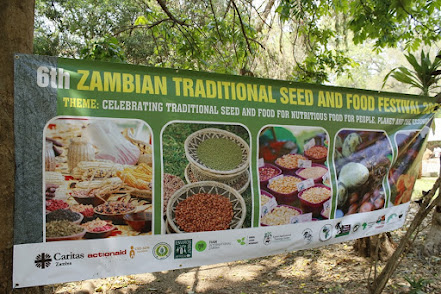“KILLING THE INFORMAL SEED SECTOR, IS KILLING CROP DIVERSITY,” …….So let us protect the informal seed sector system to preserve crop diversity
By Christopher Chisi
The Participatory Ecological Land-Use Management–PELUM Zambia says there is a need to protect the informal seed sector which mainly comprises the local traditional seed system, in order to preserve the country’s crop diversity.
PELUM Zambia Programs Officer, Wilfred Miga has cautioned that killing the informal seed sector is tantamount to destroying all the crop diversity it promotes.
Mr. Miga emphasized the need to ensure that the informal seed sector which does not only thrive within the communities but also has some cultural attachments is well preserved.
Speaking in his presentation dubbed the seed sector during the just ended three days-Ecological Organic Agriculture Media training held in Lusaka, Mr. Miga expressed concern that at present, the country’s seed industry has been infiltrated by some multinational companies while the informal seed system is being weakened.
He regretted that at the same time, farmers are being subjected to perpetual poverty by being supplied with hybrid seeds whose germination capacity reduces if used for more than one farming season thereby reducing their crop yields.
Further Mr. Miga noted with concern that despite not having a seed policy, the country has very strong plant breeders' rights which protects the multinational companies who have their interests at the expense of the local traditional seed.
“The informal seed system has no certified seeds and thrives through exchange within the local community. It mainly comprises our own local and traditional seeds such as Gankata and Kapya Wangu. We have foods such as Bondwe and Kalembula, which come from the informal seed sector and if we kill this sector it means we are killing all that [crop] diversity and that all the money will now be going outside the country while the food system will be controlled by very few multinational companies which have their interest.”
Mr. Miga pointed out that one of the implications of the multinational companies controlling the seed industry is that they will have the economic power to control the country’s food system.
“That is why if you are sold a [Hybrid ] seed today and you plant, you cannot use it next year (farming season), they will tell you to buy another one[next season]. If you don’t buy another one and you decide to plant the old one, its vigor reduces. All these are gimmicks to make farmers continuously buy the seeds year in, year out because they are in business.”
“The food system power is dwindling [but also] going to few companies, you see, even here in Zambia, there are companies that are merging………..this is an issue of power. We should understand that once the seed is controlled and regulations are changed to favour the multinationals, it means we [the country] will become weak, which is new colonialism, this is a serious issue and we should guard against it. They are now colonializing us through the food system,” Mr. Miga explained.
“We have heard in Zambia that the Biosafety law is being revised, once this is done, the country’s biosafety policy which is one of the strongest will become weak to allow the growing of Genetically Modified Organism-GMO [seeds]. There is what we call seed harmonization taking place at the Southern Africa Development Community-SADC level. They are trying to ensure that all seeds laws within the region conform to the African Regional Intellectual Property Organization-ARIPO PROTOCOL (https:www.apbrebes.org/news/draft-aripo-protocol-plant-varieties-whose-interest-does-it-serve). This protocol conforms to the International Union for the Protection of New Verities of Plant- UPOV which categorically states that “the exchange and sale of traditional seeds should be prohibited.” Certain countries are members of UPOV…..for example, Kenya. I don’t know if Zambia is a member but as of this year it was. Currently, in Kenya, they are discussing the possibility of criminalizing the exchange and sale of their traditional seeds. And once we (Zambia) become a member of UPOV these things (criminalizing the exchange and sale of their traditional seeds) will come to us. I want you to understand that our seed varieties are the way to go, it’s not like we should do away with hybrid [seeds] but let us ….begin to think of how best we can preserve our very own local traditional seed system which has diverse food types,” he said.
He bemoaned the lack of a legal framework to support and promote local traditional seeds to prevent them from getting extinct.
“There is no legal support framework. These hybrids [seeds] are being developed over time and every year, there are new verities that are coming out [on the market] but then you find that our own local seeds have not been developed. If there was a supportive legal framework together with the budget to promote the local seed industry it can thrive. Secondly, there is no market for our local seeds, Therefore, farmers when they are doing agricultural activities they are doing it as a business. So they cannot grow Gankata because there is no market for it, that goes back to the policy framework. Some of you have not seen these local seeds because they are on the verge of becoming extinct,” he noted.





Comments
Post a Comment